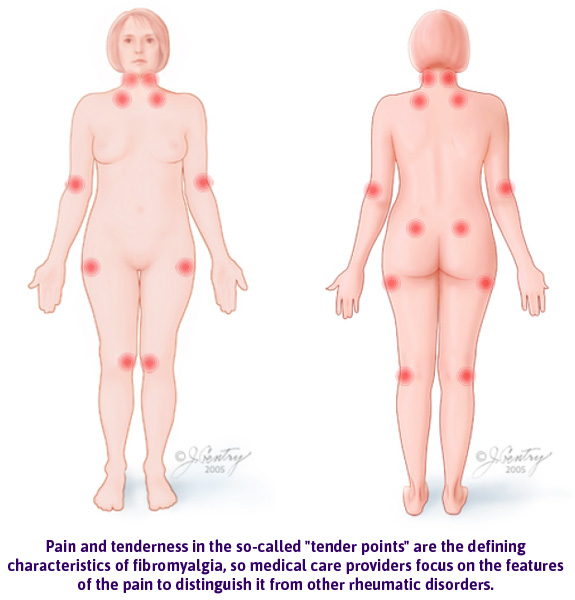Fibromyalgia
What is fibromyalgia?
Fibromyalgia is an often misunderstood—even unrecognized—disorder that causes widespread muscle pain and tenderness which tends to come and go and move about the body. This common and chronic condition typically is associated with fatigue and sleep disturbances.
Fibromyalgia is defined by chronic widespread muscular pain and tenderness. Many people with fibromyalgia also experience additional symptoms such as fatigue, sleep disturbances, stiffness, cognitive and memory problems, and symptoms of depression and anxiety. More localized pain conditions often occur in patients with fibromyalgia, including migraine or tension headaches, temporomandibular disorder, irritable bowel syndrome, gastroesophageal reflux disorder, irritable bladder, and pelvic pain syndromes. The symptoms of fibromyalgia and associated conditions can vary in intensity and wax and wane over time. Stress often worsens these symptoms.

What causes fibromyalgia?
The causes of fibromyalgia may be different in different people. However, it is very likely that there are certain types of genes that can predispose people to developing fibromyalgia and other co‐occurring conditions. Genes alone do not, however, cause fibromyalgia. There is usually some triggering factor, such as spine disorders, arthritis, trauma, and other types of physical stressors. Emotional stressors also may play a triggering role. The result is changes in the way the body communicates with the spinal cord and brain associated with altered levels of chemicals and proteins in the central nervous system. For the person with fibromyalgia, it is as though the “volume control” is turned up too high in the brain's pain processing areas.
Who gets fibromyalgia?
Fibromyalgia is most common in women, though men also can develop fibromyalgia. The disorder most commonly has its onset in middle adulthood, but can occur in adolescence and old age. Those who have a rheumatic disease such as osteoarthritis, lupus, rheumatoid arthritis, or ankylosing spondylitis also are at higher risk for developing fibromyalgia.
 Riverside6180 Brockton Avenue, Riverside, CA 92506
Riverside6180 Brockton Avenue, Riverside, CA 92506 La Sierra4244 Riverwalk Parkway, Riverside, CA 92505
La Sierra4244 Riverwalk Parkway, Riverside, CA 92505






